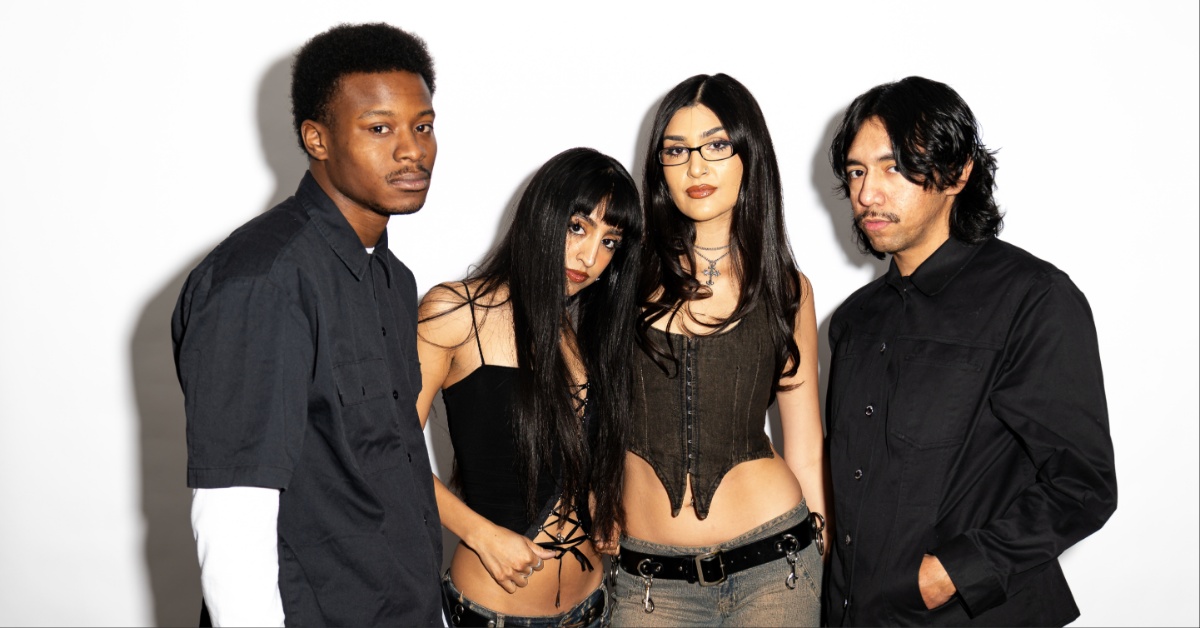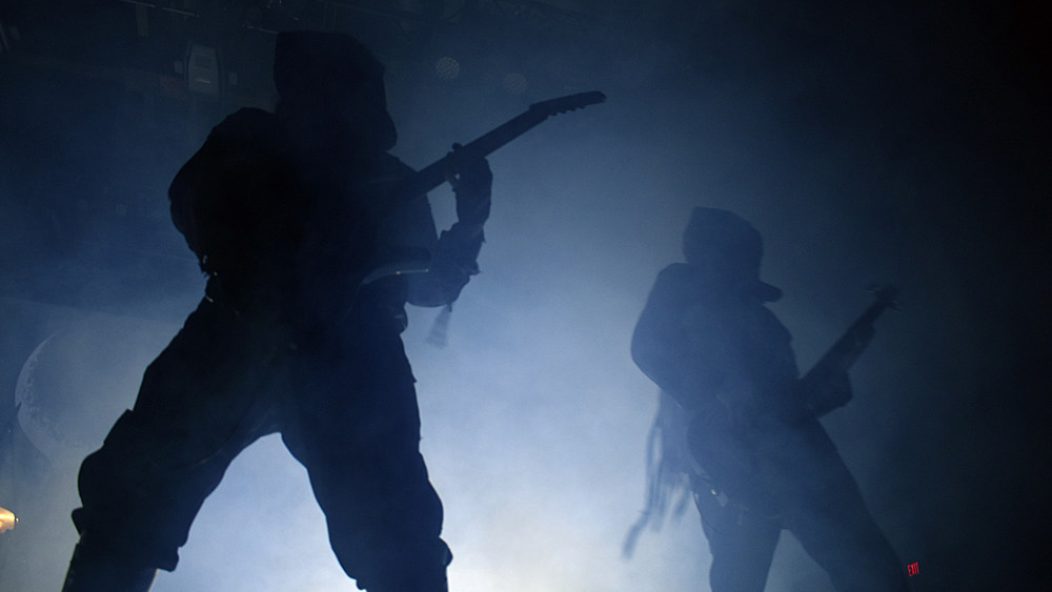
The Hops of Wrath: Decibel Metal & Beer Fest 2019 Live Report
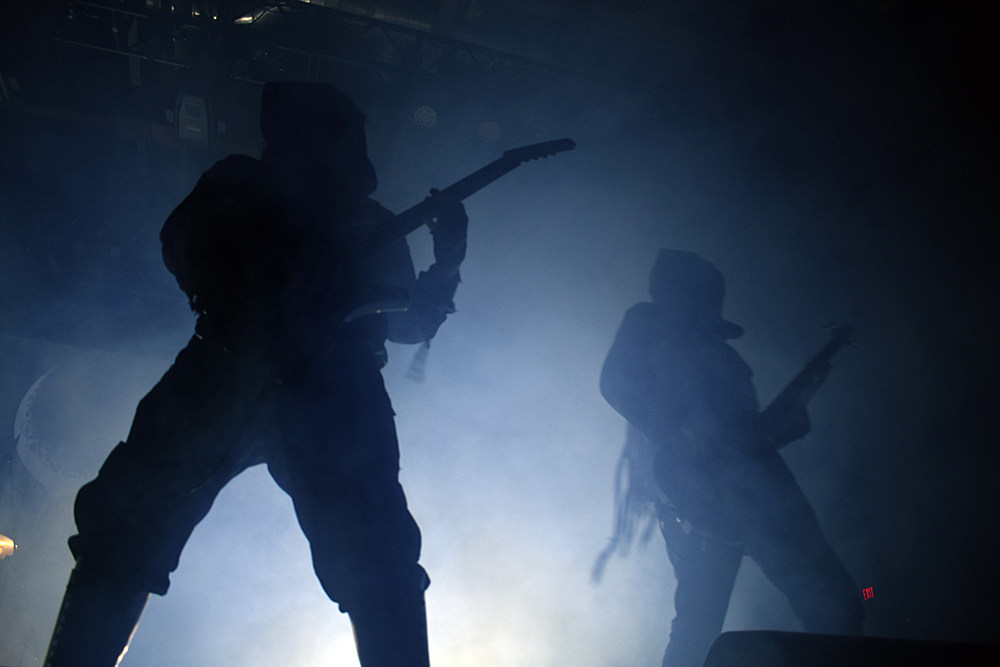
…
The novelty has worn off. Decibel Magazine putting on the first Metal & Beer Fest in 2017 could have been an experiment, a way for overworked and underpaid metal magazine staffers to drink for free. The second installment last year could have just meant they were still thirsty.
By holding the Metal & Beer Fest a third consecutive year (plus the inaugural Los Angeles gathering last December), it shows that the merger of craft beer with underground extreme music is as good an idea in practice as it looked on paper. It means that more fans will be making Philadelphia a travel destination, just as Maryland Deathfest sees heshers from all corners of the planet descending upon Baltimore. It’s also an indicator that the craft beer world embraces metal with the same passion that metalheads embrace tankards, goblets, pint glasses, bottles, and cans in their sweaty mitts.
Decibel didn’t make wholesale changes to the structure of the festival — it was still one stage in one venue over one weekend. Good on them for this.
However, there seemed to be a lot more breweries present this year, with three of them stuck upstairs in the balcony area. This, and the fact that attendees only had 30 minutes after “Doors and Pours” to sample their wares (previous years had an hour each day), made it difficult to set aside time for drinking and hitting the many merch booths without making tough choices on bands to skip. This might have been less difficult for those who didn’t want to see every band that performed — unlike, say, Invisible Oranges correspondents who felt an obligation to catch as much of the performances as possible. Metal is the first word in “Metal & Beer” for a reason.
Originally, the thought was to have a separate piece where the beers (and in one case, a mead!) were sampled and critiqued. Unfortunately the length of set changes proved to be too short to do much more than wander around the halls and quaff a small pour or two before running back when the next band hit the stage. It also made conversations with representatives from the breweries harder, which was the biggest casualty to time constraints — forget the fact that the breweries are businesses and actually connecting with people who may want to tour their brewery or pick up a six-pack. Concerts and drinking are both social activities: choosing between bands or beer was bad enough, but running out of time to try every ale, sour, porter, IPA, and stout seemed like a crime.
Decibel does a great job of making sure there’s not so much music that it becomes a chore to see every band. Every group has ample time onstage to placate fans who were there to see them in particular and impress others who never heard a note of their music but wound up picking up their shirt after the set. But showing that same concern for the alcoholics in the crowd would be appreciated.
…
Day One
…
Wake had to be the most appropriately-named band to open a festival, any festival. It wasn’t ridiculously early like some fests, but it was still unfathomably sunny outside when these Calgary grinders hit the stage. A half hour of spirited crust was a perfect shot before an entire day of beer to chase it with. Tomb Mold also served as a perfect appetizer for what was to come: the densely-packed riffs and claustrophobic, suffocating vibe make them the heir apparent to Obituary who would be one of the featured acts later in the day.
Tomb Mold didn’t make much use of the stage that was about five times larger than their last time in town (having Max Klebanoff sing from behind the drum kit will always be a challenge), but they weren’t intimidated by it either. They simply crushed everything in sight and made it look easy.
…
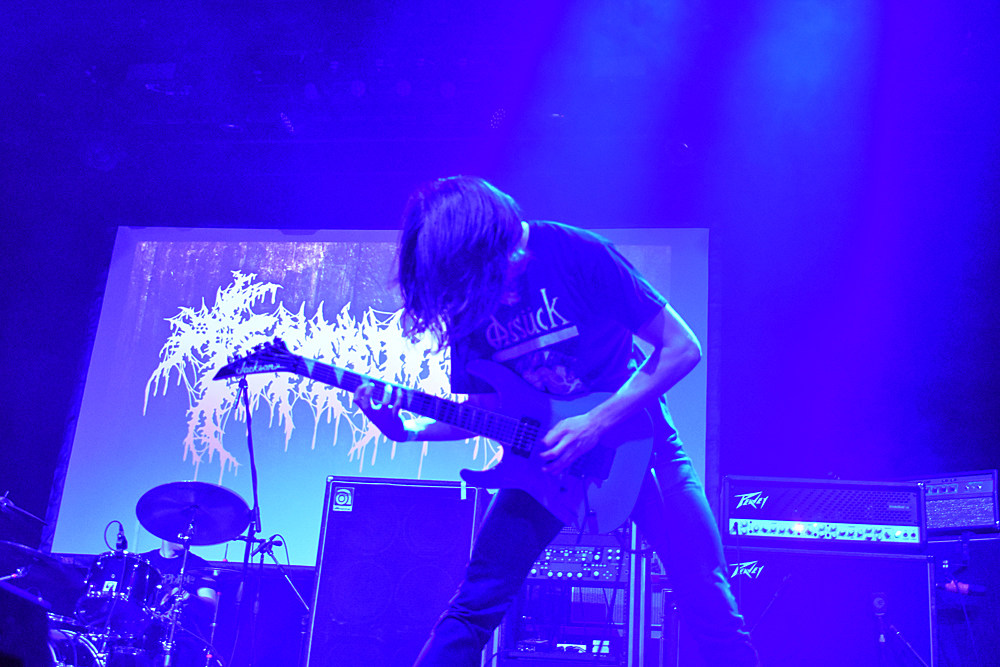
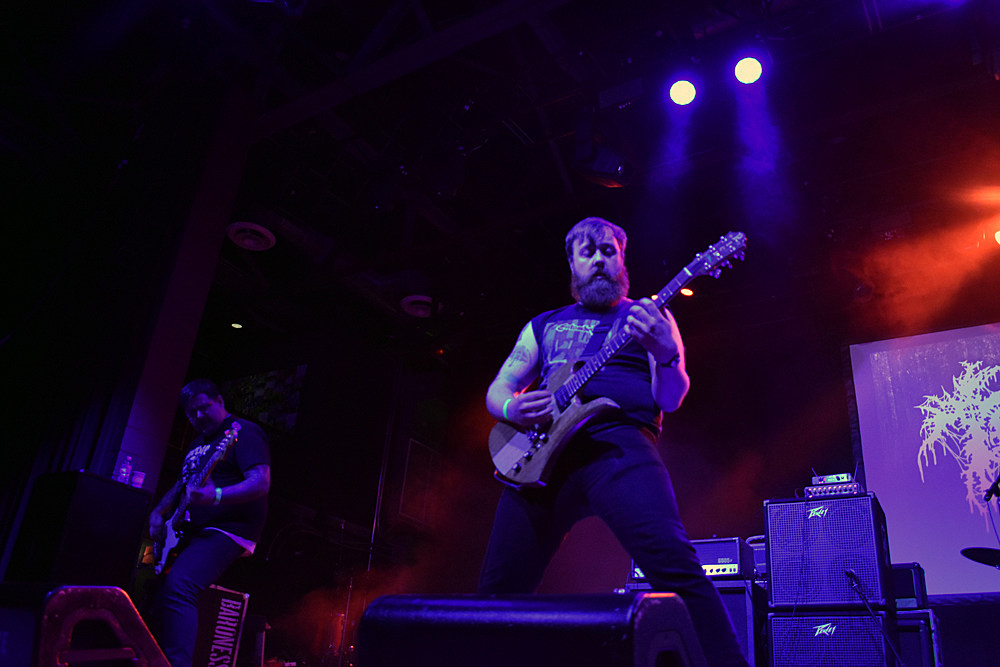
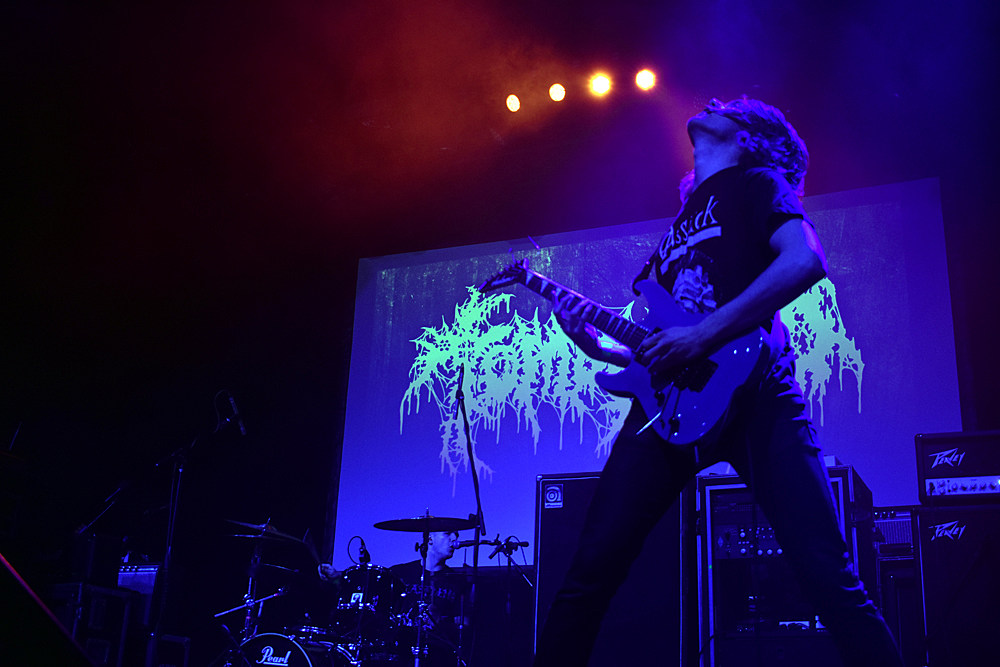
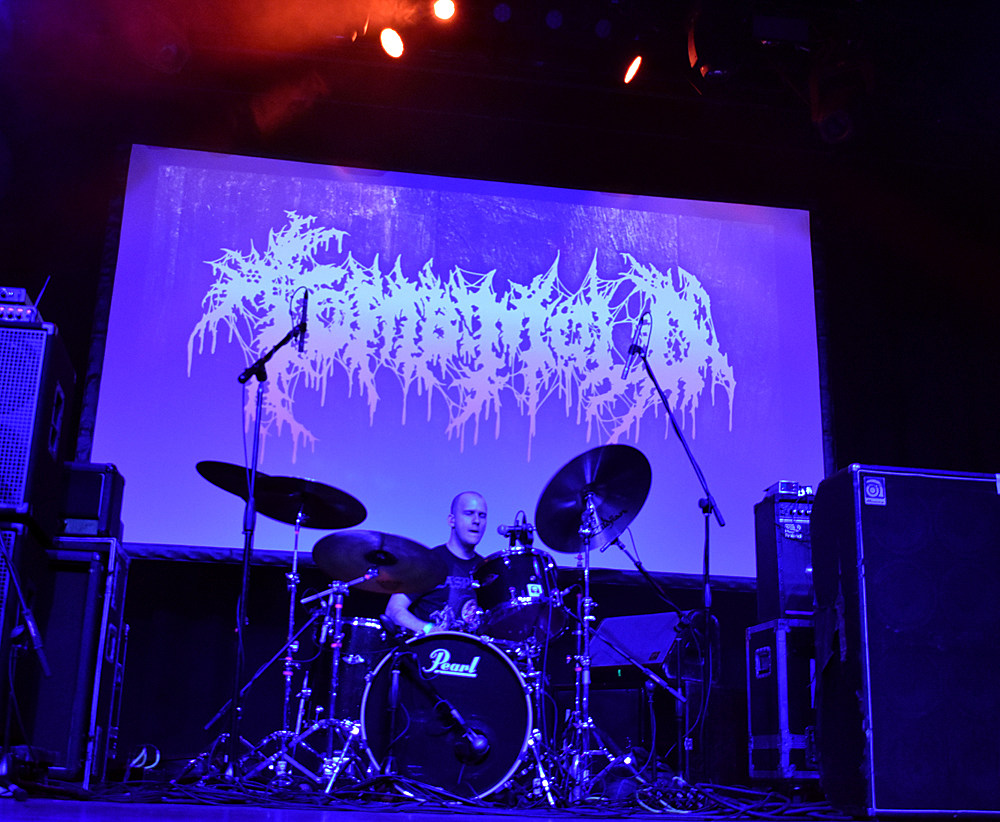
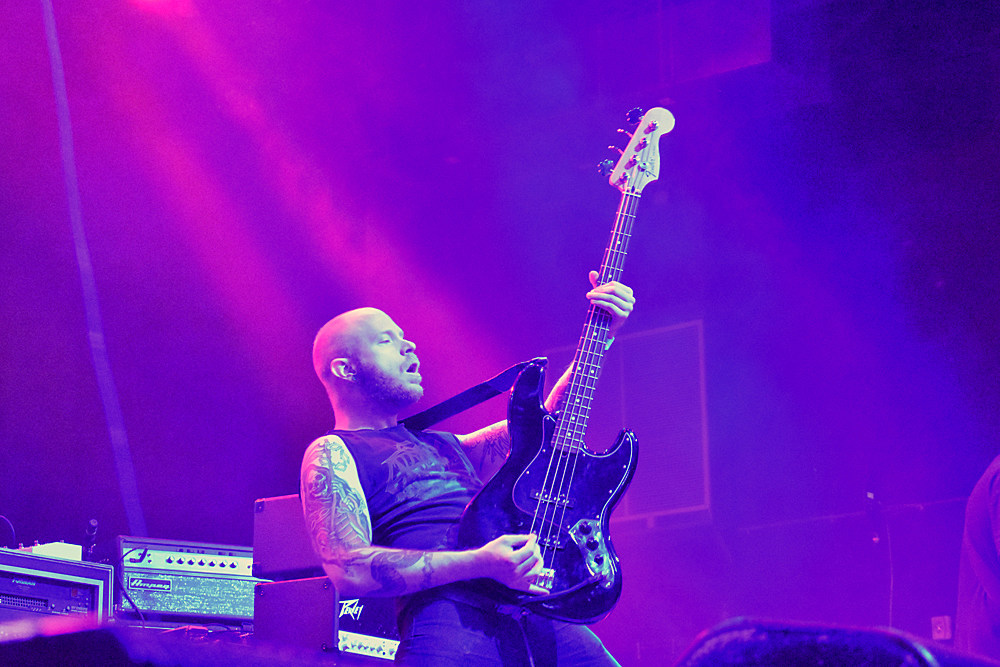
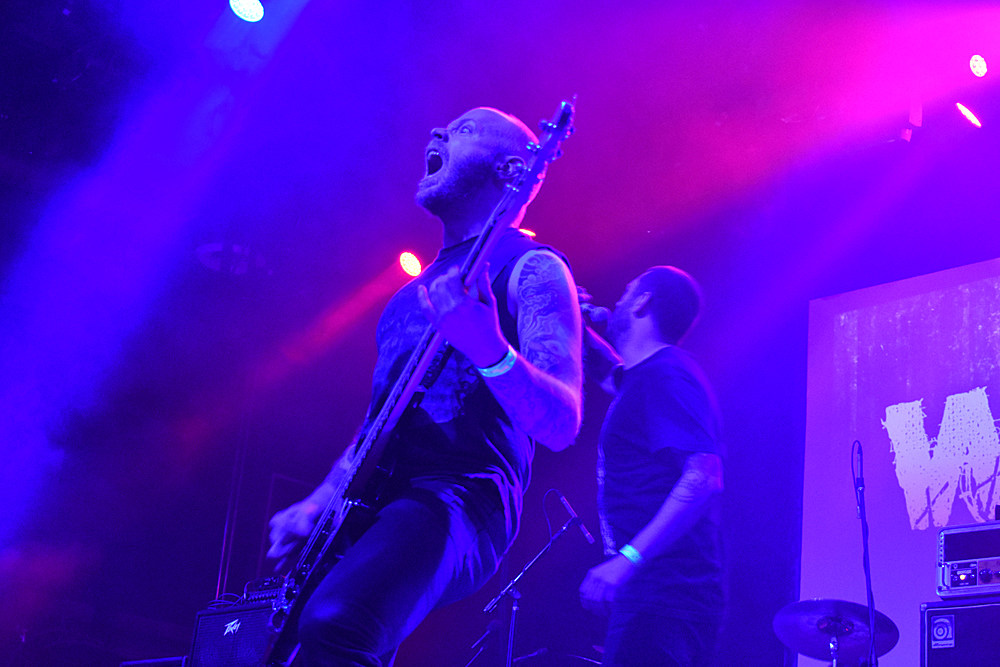
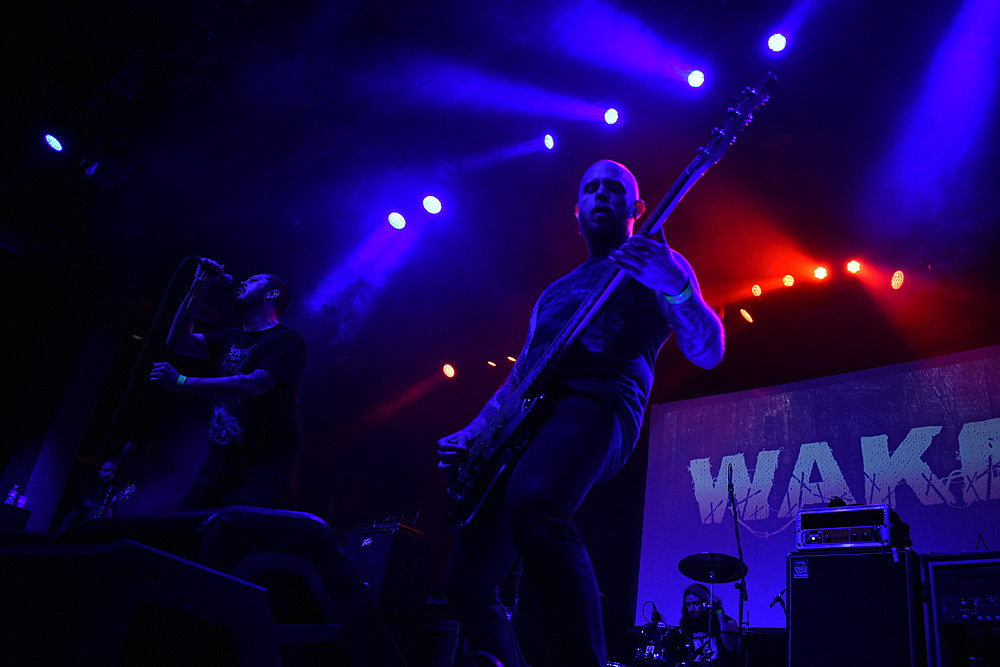
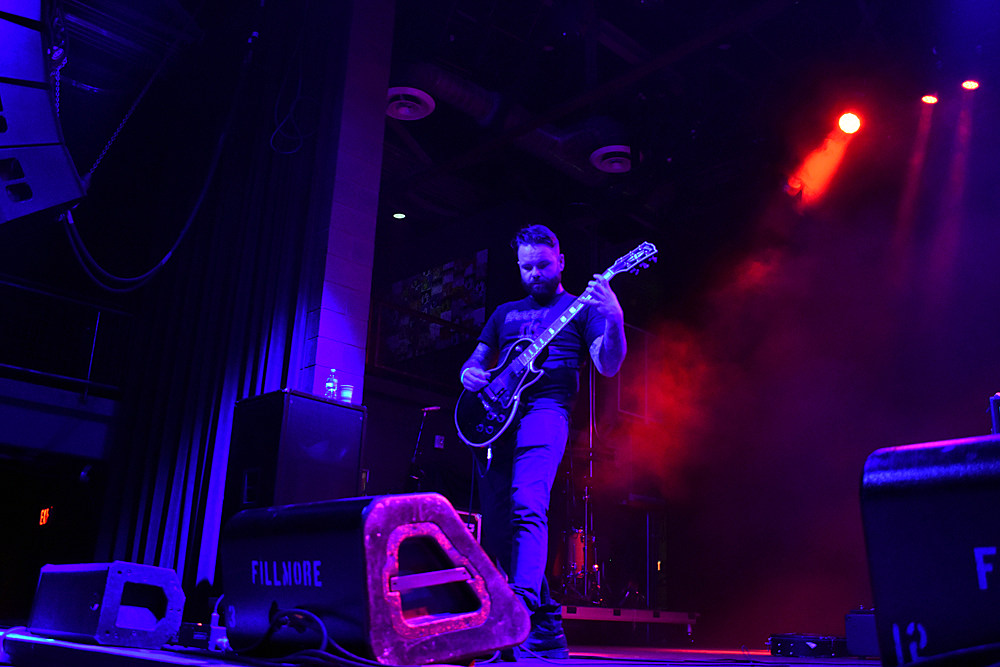
…
It’s always kind of funny how Mike Hill’s guitar looks so tiny in his hands — the Tombs frontman has imposing, muscular arms protruding from a sleeveless shirt. That and his short graying hair and wide stance makes it look like he’s in a hardcore band playing a CBGBs matinee. It actually translates to the music somewhat: the band’s unique post-black metal seems more raw, antagonistic, and confrontational from the Fillmore stage than on their albums. Whatever nuance is lost is more than made up for with blunt force. And bassist Ben Brand particularly got into the spirit of the fest by having a beer holder affixed to his mic stand.
With the howl of a wolf and a prerecorded symphonic intro playing while the cloaked band lumbered onto a darkened, fog-filled stage, Uada was the first band to bring spectacle to the big stage. It was a welcome addition and not just to set the band apart visually. Uada has been one of those groups whose albums seemed to just miss the mark, especially when compared to the glut of Pacific Northwestern black metal. That may still be the case, but playing under the cover of hoods and haze, the dots were connected. The organic songcraft and even the more ornate facets of the band seemed more pronounced, brought to life by the Portland group. To say they rose to the occasion is an understatement. It’s time to revisit Cult of a Dying Sun.
…
…
The Decibel crew always manages to bring at least one band to the Metal & Beer Fest who isn’t just a band routing their tour through Philly but rather a rare event which likely draws more people to drive farther than they might for even the headliners. The first fest featured a very rare live appearance by the notoriously glossophobic Panopticon, while last year’s edition featured Repulsion, a band whose legend was not built through non-stop touring. So, this year’s “I never thought I’d see them in concert” performer was Exhorder. The band released a couple of revered cult classics in the early 1990s on Roadrunner and might have vanished altogether had Phil Anselmo not found platinum success by incorporating the pioneering groove thrash of his NOLA pals into Pantera. To this day, there are people who bitterly complain about this.
Even though only vocalist Vinnie LaBella and guitarist Kyle Thomas date back to the formative days of the group, it was a treat to see Exhorder perform songs from Slaughter in the Vatican nearly three decades after they were released.
“We wrote this one when we were angry young men,” LaBella said introducing the title track of their second and heretofore last album The Law. “Now we’re angry old men,” he joked. Even cooler was when they played “Unforgiven” which dates back to the band’s first demo in 1986. That likely predates the birth of many attendees. Nevertheless, the band was thrashy and fun and managed to both rekindle memories while making new ones as well. That’s hard to complain about.
It’s not a comeback for Obituary. That happened back in 2003, which means the Floridian death metal originators have been an active band, touring and releasing new albums for some time. But in the band’s entire history, they never performed their classic 1990 album Cause of Death in its entirety. Until now.
It’s not a surprise that the band is a well-oiled machine as they churned out one of the landmark releases in death metal history. It’s natural to gravitate toward the songs that the band has performed more frequently (having a timeless quality ensured their repeated appearance in Obituary sets) — so sure, “Find the Arise,” with its slashing stop-start riffs and the title track with its viciously slithering riffing both stood out. And although the band has played everything from the record at least some of the time, “Body Bag” had previously been performed only 55 times (according to setlist.fm). There were other times that Obituary condensed some tracks into medleys. And of course seeing their massive cover of Celtic Frost’s “Circle of the Tyrants” was the rarest of treats.
…
…
The crowd noticeably thinned out for Baroness — some of it was probably fatigue brought upon by six hours of metal and beer, though the real reason was more likely that as of late — certainly since Purple — the band has eschewed its sludgier instincts. These tribalistic purity tests are dumb for a lot of reasons, the most obvious being that even if they traded in Sabbath riffs for Captain Beyond’s southern fried prog, Captain Beyond was still plenty heavy. And so is Baroness in its own unique way.
The band treated this like a Baroness show and not as part of a festival lineup. They used their own backdrop instead of the ubiquitous single video screen like every other band had done the past three years, and their setlist was nearly identical to the rest of the tour they wrapped up with this appearance. The inclusion of more pensive tracks showed a band confident that they didn’t need to conform to metallic expectations — they proudly played the bluesy “If I Have to Wake Up (Would You Stop the Rain?)” and the jazzy “Fugue” back to back. Hell, they might not have even drunk any beer.
In typical Baroness fashion, they defined the moment rather than let the moment define them.
This was the first show for new guitarist Gina Gleason in her hometown. It was obvious how stoked she was to be in front of friends and family several levels beyond the all-female tribute bands she previously played in locally. Her backing vocals add a new dimension to older material and the way she plays together with John Baizley makes it obvious that she’s a good fit and will be even when there aren’t people screaming her name.
The band performed two tracks off their forthcoming Gold & Grey release, not coincidentally the cuts they have already revealed. “Borderlines” with its fuzzy Hawkwindian psychedelic allusions went over quite well considering its relative unfamiliarity, while the hyper-prog of “Seasons” left many agape. Anyway, June 14th, when the new album comes out, can’t get here soon enough.
…
…
Day Two
…
Outer Heaven seemed a little dazed when they staggered onto the stage — 4:30 p.m. may not be primetime for death metal, but it’s not that early! They must have had a late night. Fortunately, the band reanimated quickly and acclimated themselves to the large stage quite well: vocalist Austin Haines made good use of the space, throwing his hirsute, hulky frame around the stage like he owned it. The band’s groove-oriented take on old-school death metal reverence was a nice start to the day.
No unsigned bands have performed the Fest (Cemetery Piss was on indie Cricket Cemetery when they opened 2017’s second day), but locals Heavy Temple justified the faith that Decibel has in them. It’s been mere months since the band’s lineup imploded, leaving Elyse “High Priestess Nighthawk” Mitchell to recruit a drummer and guitarist; however, you wouldn’t have known it based on their searing 30-minute set under a kaleidoscopic sky. It’s as if Janis Joplin joined Black Sabbath though with a much darker edge that can only come from darker psychedelics and these dark times we reside in. If Decibel ever decides to do a Metal & Hash Fest, Heavy Temple should headline.
Rosetta was a perfect transition between the structured psychedelia of Heavy Temple and the unambiguous metal that would follow. The group has been churning out ethereal shoegazing metal since before post-metal was an established genre unto itself (making them “pre-post-metal” if you want to infuriate linguists and metal purists alike). Vocalist Michael Armine wore sunglasses the entire set even though they kept the venue darker than with most bands. This was befitting the darkness that permeates Rosetta’s material, turning even the most melodic moments into hazy melodrama.
…
…
There was no such melodrama with Deceased. There never has been, and there’s not a safer bet in all of Las Vegas that can be made that there never will be. The band somehow condensed three decades into 40 minutes, including two songs from the latest album performed for the first time. The NWOBHM-on-speed intensity of “Endless Well” and “The Shivers” was a nice treat.
Worth noting is the phenomenal job Amos Rifkin did taking over the drum throne from Dave Castillo. Although it was his first show since Castillo’s passing, Deceased main man King Fowley didn’t dwell on it. The closest he came to getting emotional was when someone screamed out they loved him, he replied, “Bet you never thought you’d love someone this ugly.”
Fowley is to old school American death metal as Enslaved is to old-school Norwegian black metal: Other bands from their respective scenes may come to mind before them, but that shouldn’t diminish their importance, and true fans are keenly aware of this. Unlike Deceased, Enslaved has deviated from its roots in recent years, which is what made the current lineup perform 1994’s Frost in its entirety a rare and special event.
What stood out seeing Ivar Bjørnson and Grutle Kjellson perform the quarter-century old album was how misguided those who write the band off as progressive wankers these days are. This record (and therefore this set) ran the gamut from raw, icy cold black metal fury (“Wotan” was breathtaking) to Paganized vestiges of what would eventually become Viking metal, with enough atmosphere that you could literally watch and point out the specific moments that inspired the current crop of black metallers.
…
…
It’s a safe bet that the Deafheaven guys were watching from the wings, mentally taking notes.
The crowd cleared out a little for them, which frankly was understandable given the special nature of the sets that happened before and afterward. We certainly lost the kinds of people who would shake their heads at the kinds of bands that would drape their drum kit in hundreds of white roses. They might have felt a better use of their time would have been to drink the last beer before it ran out or peruse the rapidly-closing merch tables before they packed up. It was their loss, of course.
The amazing thing about Deafheaven is that the more times you see them play, the more there is to discover. This time out, the way Kerry McCoy’s solo during “Honeycomb” perfectly aped J. Mascis’ low-key squeals as it dissolved into the subversive melody of the song was thrilling to hear even if it was the dozenth time hearing it. As heavy as Deafheaven can be if they set their mind to it, there’s always something subtle and unexpected hidden within the more prominent elements that makes everything work. Even live, in a festival environment on the last show of the current tour, these audio easter eggs are inescapable. You just need to be open to the discovery.
…
…
Tom Warrior has never made things easy. Not being contented with being the heaviest band around, Celtic Frost released Into The Pandemonium, essentially introducing the avant-garde (and Wall of Voodoo) to bewildered subterranean metalheads. And then there was Cold Lake, of which even the frontman concedes was a mistake.
Triptykon has been frustrating because of relative inactivity. In over a decade of existence the group has only two albums to its credit. The most recent release Melana Chasmata came out exactly five years to the day before this appearance. There also hasn’t been a US tour since back in October 2010. Because the appearance at Decibel’s Metal & Beer Fest Los Angeles didn’t even include Triptykon material (it was a Celtic Frost set), the only time music from the last album was ever played on these shores was during the 2015 Maryland Death Fest.
The best way to make it worth the wait was apparently to drag the show out. It began with “Synagoga Satanae,” a lumbering dirge lasting nearly 15 minutes but seemed twice as long due to the band’s lethargic pace. This would be an ongoing theme for the set. “Goetia,” clocking in at 11 minutes, was the first of a handful of Triptykon songs. Bassist Vanja Šlajh’s long-flowing black hair shined in the spotlights as she whipped it around. During “Altar of Deceit,” new drummer Hannes Grossmann belied his flashy tech-death pedigree by providing perfect plodding metronome.
The band actually would play more Celtic Frost material than anything else with an emphasis on the slower, grinding material. This included “Procreation (of the Wicked),” “Dethroned Emperor,” and even “Circle of the Tyrants,” which was considerably slower and more menacing than the original. Warrior used his wah pedal to drive a psychedelic freakout of a solo that would have sounded out of place in 1985 but fit in perfectly in Philadelphia over three decades later.
Triptykon would end the set with “The Prolonging,” the post-metallic doom song which washed over the entire venue for 20 eerie minutes. Most bands wouldn’t have such an intense, meandering moment be the last thing that the audience heard, but we already established that Warrior doesn’t ever make things easy.
…
…
Support Invisible Oranges on Patreon; check out Invisible Oranges merchandise on Awesome Distro.
…








